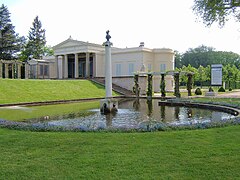Charlottenhof Palace
| Charlottenhof Palace | |
|---|---|
| Schloss Charlottenhof | |

Charlottenhof Palace
|
|
|
Location in Germany
|
|
| General information | |
| Type | Palace |
| Architectural style | Neoclassical |
| Town or city | Potsdam |
| Country | Germany |
| Coordinates | 52°23′42″N 13°01′30″E / 52.395°N 13.025°E |
| Construction started | 1826 |
| Completed | 1829 |
| Client | Frederick William IV of Prussia |
| Owner | Stiftung Preußische Schlösser und Gärten Berlin-Brandenburg |
| Design and construction | |
| Architect |
Karl Friedrich Schinkel Ludwig Persius |
| Website | |
| Schloss Charlottenhof | |
| Palaces and Parks of Potsdam and Berlin | |
|---|---|
| Name as inscribed on the World Heritage List | |
| Location | Germany |
| Type | Cultural |
| Criteria | i, ii, iv |
| Reference | 532 |
| UNESCO region | Europe and North America |
| Inscription history | |
| Inscription | 1990 (extended in 1992 and 1999) (14th Session) |
Charlottenhof Palace or Charlottenhof Manor (German: Schloss Charlottenhof) is a former royal palace located southwest of Sanssouci Palace in Sanssouci Park at Potsdam, Germany. It is best known as the summer residence of Crown Prince Frederick William (later King Frederick William IV of Prussia). Today it is maintained by the Prussian Palaces and Gardens Foundation Berlin-Brandenburg.
The park area with its various buildings can be traced back to the 18th century. After it had changed hands several times, King Frederick William III of Prussia bought the land that borders the south of Sanssouci Park and gave it to his son Frederick William and his wife Elisabeth Ludovika for Christmas in 1825.
The Crown Prince charged the architect Karl Friedrich Schinkel with the remodeling of an already existing farm house and the project was completed at low cost from 1826 through 1829. In the end, Schinkel, with the help of his student Ludwig Persius, built a small Neoclassical palace on the foundations of the old farm house in the image of a Roman villa.
With designs he created himself the artistically inclined Crown Prince participated in the planning process for the palace and surrounding park. He referred to this summer residence as "Siam", which at the time was considered "the Land of the Free", and to himself jokingly as the "Siam House architect".
Officially the palace and park were named "Charlottenhof" in honor of Maria Charlotte von Gentzkow who had owned the property from 1790 to 1794.
The interior design of the ten rooms is still largely intact. The furniture, for the most part designed by Schinkel himself, is remarkable for its simple and cultivated style.
...
Wikipedia

